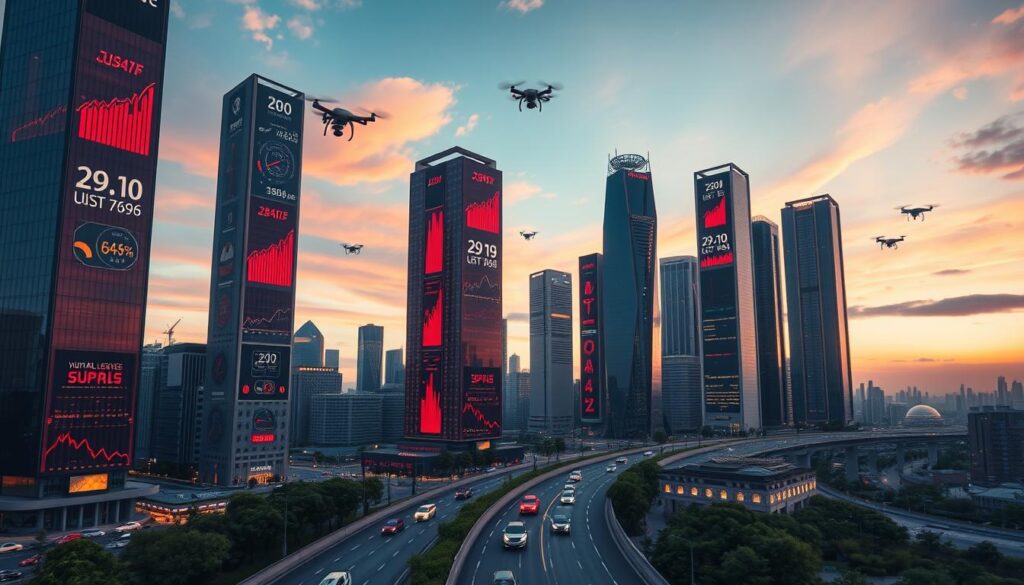In the world of artificial intelligence, a big competition is happening. It’s between ChatGPT and Claude, two top language models. We’ll look at their strengths and weaknesses to see who might win this tech battle.
The AI market is growing fast. It’s expected to jump from $1,590.93 million in 2023 to $259,817.73 million by 2030. ChatGPT and Claude are leading this growth. ChatGPT has 180 million users as of February 2024. Claude is catching up quickly with millions of users too.
These AI models are changing how we use technology. They help with creating content and supporting customers. But, which one will be the top AI assistant? We’ll check out their features and how they might change our digital world.
Key Takeaways
- ChatGPT and Claude are leading the charge in commercial AI language models
- The AI market is projected to reach $259,817.73 million by 2030
- ChatGPT has 180 million monthly users, while Claude is rapidly gaining popularity
- Both AI assistants excel in different areas of natural language processing
- The battle between these AI LLMs could shape the future of conversational AI
Introduction to AI Language Models

AI language models have changed the tech world a lot. These advanced systems, known as Large Language Models (LLMs), are key to today’s AI helpers. We’ve seen a big increase in AI chatbots, with ChatGPT and Anthropic Claude leading the way.
What Are Large Language Models?
LLMs are AI systems trained on huge text datasets. They learn to understand and create text like humans. This tech powers AI chatbots like ChatGPT and Claude, making them talk like people and help with many tasks.
The Rise of AI Chatbots
AI chatbots have become very popular. ChatGPT has about 180.5 million users as of March 2024. Anthropic’s Claude can handle about 75,000 words at once, almost like a short book.
Impact on Today’s Tech Landscape
AI assistants are changing many industries. They automate tasks, improve customer service, and help make better decisions. ChatGPT can browse the internet and create images, while Claude offers cheaper API access and can handle more data.
“AI chatbots are not just tools; they’re revolutionizing how we interact with technology and process information.”
The abilities of these AI models keep growing. OpenAI is always making ChatGPT better with new features. Anthropic’s Claude 3 series, released in early March, includes advanced models like Claude 3 Opus, Sonnet, and Haiku. As AI chatbots get better, they will play a bigger role in our digital future.
The AI Market: Growth and Projections

The AI market is growing fast, thanks to new AI technology and tools. This change is transforming how businesses work and talk to customers. The large language model (LLM) market is leading this change, expected to grow from $1,590.93 million in 2023 to $259,817.73 million by 2030.
Big tech companies are racing to get ahead. OpenAI’s ChatGPT-4 has 180 million users, while Google’s Gemini has over a billion. Anthropic’s Claude 2 can handle 75,000 words at once. These tools are changing industries, from making content to helping with customer service.
The competition is intense, with new players joining. Meta’s Llama 2 and the Technology Innovation Institute’s Falcon are popular among developers. Canadian startup Cohere is making a splash in the business world, working with giants like McKinsey.
AI is not just a trend; it’s becoming the backbone of modern business operations.
AI is being used in many areas:
- Customer service chatbots
- Code generation
- Data management
- Content creation
- Audio transcription
- Language translation
This fast adoption shows a bright future for AI. With ongoing improvements, the world of commercial AI tools will keep evolving.
ChatGPT: OpenAI’s Revolutionary Chatbot

Since its launch in 2022, OpenAI’s ChatGPT has amazed the world. It has changed how we see artificial intelligence and understanding of natural language. ChatGPT has grown from GPT-3.5 to GPT-4, showing what AI can do in conversations.
History and Development
ChatGPT started with GPT-3.5 in 2022. OpenAI then released GPT-4 in March 2023. This showed big steps forward in understanding and creating language. It shows OpenAI’s dedication to improving AI.
Key Features and Capabilities
ChatGPT has features that make it stand out. It can understand and talk about many topics easily. It’s great at creating text and helps with coding. GPT-4 users can also analyze images, making it even more useful.
User Base and Market Penetration
ChatGPT’s popularity has grown fast. It got 1 million users in just five days. Now, it has about 180 million users every month. Its wide appeal and flexibility have made it popular. Users can pick from free options or pay for premium services like ChatGPT Plus ($20/month) and Team ($25/month).
“ChatGPT has revolutionized how we interact with AI, making advanced natural language processing accessible to millions worldwide.”
Claude: Anthropic’s Challenger to ChatGPT
Anthropic’s Claude is a strong rival to ChatGPT in the AI world. It focuses on ethical ai and has great abilities.
Claude is great at making article outlines and solving tough questions. It can handle up to 75,000 words at once. This is very useful for tasks that need a lot of context.
Claude is also very flexible. It can work with different file types, get real-time internet info, and help with coding. These skills make it excellent for research and analysis.
“Claude lagged slightly behind other platforms in the test but excelled in generating article outlines, handling queries well, and accepting larger prompts.”
Anthropic cares a lot about data privacy with Claude. It has both free and paid versions. This meets different user needs while keeping ethical ai practices in mind.
- Uses Constitutional AI for ethical decision-making
- Processes up to 75,000 words at once
- Excels in article outline generation
- Offers real-time internet access
Even though Claude might not be the best in every area, its unique approach and skills make it a top choice in the AI world.
Battle of the Commercial AI LLM Chat GPT v Claudie
In the world of AI, ChatGPT and Claude are two big names. We’ll look at their good points, bad points, and how they compare in different tasks.
Head-to-Head Comparison
ChatGPT uses OpenAI’s GPT-3.5 and has billions of parameters. It learns without supervision and has quickly gained over 100 million users. Claude, on the other hand, is based on Anthropic’s Constitutional AI model. It can handle up to 75,000 words at once.
Strengths and Weaknesses
ChatGPT is great at making content and has plugins like WebChatGPT for the internet. Its Plus subscription also includes DALL-E 3 for making AI images. Claude is good at handling big texts and focuses on ethical AI. It also doesn’t collect or store personal data, making it a safe choice.
Performance in Various Tasks
ChatGPT is excellent at coding and has many uses. Claude is better at analyzing data and dealing with long texts. For web research, tools like perplexity.ai or you.com might be better. Marketing folks often use Jasper or Writesonic for writing content.
- ChatGPT: Excels in coding, general knowledge, and creative writing
- Claude: Shines in data analysis and handling large text volumes
- Specialized chatbots: Better for specific tasks like web research or marketing content
Choosing between ChatGPT and Claude depends on what you need. ChatGPT has more integrations and a bigger user base. But Claude focuses on ethical AI and privacy. Both are getting better, improving chatbot features and AI comparisons.
Technical Capabilities: GPT-4 vs. Claude 2
We’ve looked closely at GPT-4 and Claude 2’s technical skills. Both are top-notch in language processing. Yet, they stand out in different ways.
GPT-4 can handle 32,000 tokens, or about 24,000 words. It’s great at creating long content and is very original. Claude 2, however, can process 100,000 tokens, or 75,000 words. This makes it perfect for big data tasks.
GPT-4 leads in multilingual support, with over 200 languages. Claude 2 supports 10 languages. GPT-4 also does better with images, a skill Claude 2 doesn’t have.
“GPT-4 is 82% less likely to produce content against OpenAI’s rules compared to its predecessor.”
Both models have good prices. GPT-4 costs $0.03 or $0.06 per 1K tokens. Claude 2’s prices range from $0.80 to $24.00 per million tokens. Claude 2 might be a better deal, especially since GPT-4 needs a monthly subscription.
GPT-4 is used a lot for marketing and powers ChatGPT. Claude 2 is great for legal work and content checks. Both are excellent for chatbots and work well with many platforms. This makes them useful in various fields.
User Experience and Interface
We’ve looked at the user interfaces of top chatbots, focusing on how easy they are to use. The experience users have is key to their adoption of these AI tools.
Ease of Use
ChatGPT 4O has a smooth interface with features like conversation history and chat sharing. Its design is easy for everyone to use. Claude Sonnet 3.5, however, has a simpler design focused on getting tasks done. This can be good for those who like a straightforward experience.
Accessibility Features
Both platforms make sure chatbots are easy to use for everyone. They work with screen readers and allow keyboard navigation. ChatGPT Plus costs $19.99 a month and has extra features to make it easier to use. Claude’s Opus version also costs $19.99 a month and aims to make things clearer and simpler.
Platform Integration
How well a chatbot works with other platforms is important. ChatGPT connects with many platforms through plugins, making it more useful. Claude is more about direct interaction and uploading files for analysis. This affects how users can use these AI tools in their work.
“The right AI interface can make or break user adoption. It’s not just about power, but how easily that power can be harnessed.”
When picking between these AI chatbots, think about what you need. Do you want a lot of features or something simple to use? Your choice will depend on how you plan to use the AI in your work.
Ethical Considerations and Safety Measures
As AI technology grows, it’s more important than ever to use it responsibly. Both ChatGPT and Claude focus on ethics in their development. They work hard to prevent harmful or dangerous responses.
Anthropic, the company behind Claude, puts a big emphasis on ethical AI. This makes Claude more trustworthy and secure. Claude doesn’t store sensitive user data, which is a big privacy win.
ChatGPT, made by OpenAI, also has strong safety features. It has over 100 million users in 185 countries. This shows how important it is to use AI responsibly. ChatGPT’s safety features help prevent harmful content while still being useful.
“AI ethics is not just a buzzword; it’s a fundamental aspect of building trust in AI systems,” says a leading AI researcher.
The AI industry is always changing, and ethics will play a big role. We’ll see more safety measures in AI, shaping its future.
Applications in Business and Industry
AI is changing how businesses work in many areas. It’s making content, customer service, and data analysis better. Let’s see how these new technologies are changing business.
Content Creation and Marketing
AI tools are making a big impact in marketing. They create engaging content fast. This lets marketing teams work on big ideas while AI does the rest.
Customer Service and Support
AI chatbots are now the first point of contact for customers. They work around the clock, answering questions and solving problems. This lets human agents focus on harder customer issues, making service better.
Data Analysis and Decision-Making
AI analytics are changing how businesses use data. They can look through huge amounts of data, find trends, and offer insights. This helps companies make better, faster decisions.
AI is not just a tool; it’s a partner in business growth and innovation.
As AI gets better, it will help businesses even more. It’s making operations smoother and customer service better. AI is key for companies to keep up in today’s fast market.
The Future of AI: Upcoming Developments
The AI world is changing fast. We’re seeing big steps forward that will change our digital lives. The future of language models looks very promising.
AI is leading to more focused models. These models will help specific industries work better and more accurately. AI tools will soon be key in fields like healthcare and finance.
Improving how AI works is also a big goal. For example, Inflection’s Pi chatbot shows AI can be easier to use. We can expect more AI tools that are simple for everyone to use.
The future belongs to AI that’s not just smart, but also ethical and responsible.
AI’s future is also about being ethical and responsible. Companies are working on AI that respects human values and norms. This will help build trust and make AI more widely accepted.
- Specialized AI models for industry-specific tasks
- Improved computational efficiency for wider accessibility
- Emphasis on ethical AI development
- Open-source projects driving innovation
Open-source projects will be key in AI’s future. They help people work together and share ideas. This will speed up AI progress and make new technologies available to more people.
Choosing the Right AI Tool for Your Needs
Finding the perfect AI tool for your business can be tough. We’ve compared ChatGPT and Claude to help you choose wisely.
ChatGPT has 180 million users, with 100 million weekly. It’s great for digital marketers and content creators, especially in SEO blogs. Claude, though less known, has its own strengths. It can handle up to 200k tokens, perfect for long documents.
When picking a business AI solution, think about what you need. ChatGPT is top for creative writing and talking to customers. It has a free tier and a $20 monthly plan for more features. Claude is better for text analysis and legal documents, possibly offering a free trial.
- ChatGPT: Best for content creation and open-ended conversations
- Claude: Ideal for long document analysis and ethical considerations
For comparing AI tools, look at ChatGPT’s internet access and image making. Claude has a bigger context window. ChatGPT’s API lets you use real-time data, while Claude focuses on being transparent and unbiased.
Try out both tools to see which fits your business needs. The best choice depends on your tasks, budget, and AI ethics.
Conclusion
As we conclude our comparison, it’s clear that ChatGPT and Claude are at the forefront of commercial AI. They each bring unique strengths to the table. ChatGPT, built on OpenAI’s GPT-4, is great at creating content and engaging with customers. It’s perfect for marketing tasks like social media and ad writing.
Claude, developed by Anthropic, focuses on safety, ethics, and transparency. It excels in content moderation and ethical advertising. With a 100k input limit, Claude is strong in handling large datasets.
The competition between these leaders is ongoing. ChatGPT has a bigger user base, but Claude is catching up with its ethical AI focus. Both cost $20/month for their premium versions, making them affordable for businesses and individuals.
Looking ahead, the choice between ChatGPT and Claude will depend on your needs. Whether you need creativity or ethics, these AI chatbots are changing how we use technology. They’re setting the stage for even more advanced AI tools in the future.
Want to hire me as a Consultant? Head to Channel as a Service and book a meeting.

